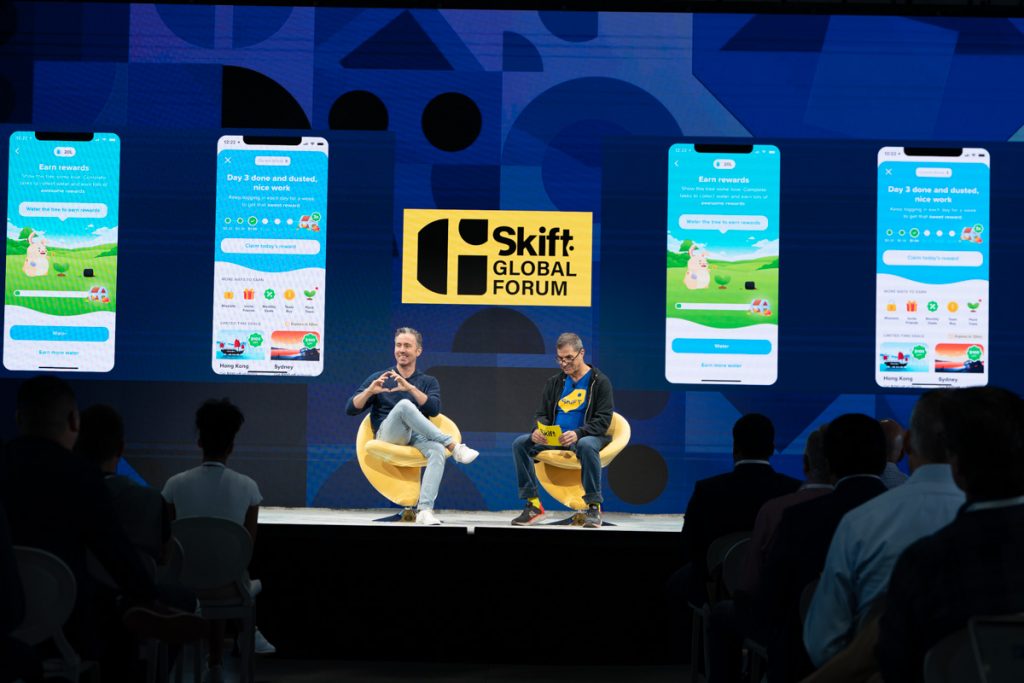
The carrot has money. There are loot boxes. The people are bunnies. What is happening in the mind of Frederic Lalonde? You're going to discover it.
Matthew is the son of Matthew.
Nobody can accuse Frederic Lalonde of going off-brand. The CEO and founder of online travel agency Hopper was, figuratively speaking, bouncing around as he talked about social commerce with moderator Dennis Schaal, Skift's founding editor and executive editor, during his interview at Skift Global Forum. On stage, Lalonde revealed the tips and tricks the app deploys to stay sticky, keep users engaged and (most importantly) spending money. Oh, and he also likes anxiety. Watch the interview in its entirety, as well as read a transcript of it, below, to get a deeper understanding of how financial technology is blurring with travel retailing, and witness a CEO who's having a lot of fun with it all. https://youtu.be/NvGupKeogzs Interview Transcript Dennis Schaal: Hello, New York. Hello, interwebs. I hope you're going to help me with this interview because between you and me, Fred has a lot of energy and he's very enthusiastic about Hopper, shock of shocks. Thanks for being here, Fred. Frederic Lalonde: Thanks for having me. Schaal: So it's sort of deja vu all over again because last year we were at TWA Hotel for our conference and you were talking about a Chinese app called Pinduoduo. How do I say that? Lalonde: I think that's right. Dennis Schaal: Okay. Frederic Lalonde: That's right. Schaal: ... as the next big thing. It started out as a farmer's app to bring farm goods online, e-commerce app, they started travel. I saw, they just did, last year, 383 billion in revenue, sort of in the Amazon neighborhood. So is China and the East still the center of innovation in travel or how do you look at it? Lalonde: I think Asia, but specifically China is the center of innovation in digital and commerce and content. I'll use TikTok as an example ... the Asian mobile ecosystem is actually innovating and completing a lot of the ideas in the west that we started to build out. And I believe that the patterns that we're seeing there are entirely applicable, and we're talking about social commerce. Schaal: Right. Lalonde: Let's do the same survey. I did this last year. Schaal: Mm-hmm. Lalonde: Raise your hand if you know what Pinduoduo is, please. Let the record show four hands. Raise your hand if you have it on your phone. Same three people. If I did that question in any conference in Asia, people would look at me like I'm crazy. It would be like asking, raise your hand if you know what Facebook is. So there's a huge, huge cleavage between what a lot of these companies are doing out in Asia and what they're doing here until they come here and they become TikTok and they become the most watched social media. So what we're really talking about is the fusion between social and commerce. And the thesis is very simple, we a hundred percent believe this is the future, is consumers in every category, including travel will agree to engage with digital products on their phone through games and streaks and all these crazy things. Schaal: Okay. Let's show a screenshot- Lalonde: Let's see what you have up there. Schaal: ... of what you're talking about. Lalonde: Yep. Schaal: So there we have, water the tree to earn rewards. Okay. What else do we got? We have Streaks, day three done and dusted. Nice work. Is this what you mean about social commerce? Lalonde: Absolutely. Absolutely. That's the very beginning. Schaal: In the way? How does it work? Lalonde: Yep. So the idea is you come in and you do something repetitive in what Google calls micro-moments like you're waiting for your latte at Starbucks and you press that Claim Today's Reward button. And if you miss a day, you lose the $10. But if you do it a couple of days straight, in this case a week, you get $10 of future booking credit. So Duolingo, some of you probably use this, in the West, it's the only real example of this, they took learning a language, which was, most people are too young to remember this Rosetta Stone, a CD-ROM, for those millennials, it was a piece of plastic that contained stuff that you would order ... and so, you would pay $600 every seven years because you were taking a trip to Italy and then, Duolingo comes along and they turn it into 125 million daily active users. Now they're profitable, they're public. And what they would do is the owl would nag you to learn another Japanese character or some Italian words for bacon. And so, fundamentally this is called engage-to-earn. So you come in and you do something that you would do anyway, so you water this tree and it grows and then, there's this secret chest that opens up and it contains vouchers and coupons. And this is actually what will replace the established eCommerce players in travel, in my opinion. And there's a whole new generation of people that are wanting to do this, but one to underpins it is that it makes the cost of booking your travel cheaper because you put in the work. Schaal: But here's the thing, Fred, the big challenge for leisure For the month, you have reached your free story limit. On October 25th, your meter will reset.
- Unlimited access to Skift.com daily news stories and articles
- Members-only columns from leading journalists
- Weekly email digest
